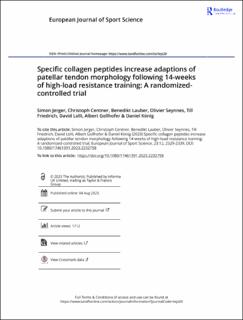| dc.contributor.author | Jerger, Simon | |
| dc.contributor.author | Centner, Christoph | |
| dc.contributor.author | Lauber, Benedikt | |
| dc.contributor.author | Friedrich, Till | |
| dc.contributor.author | Lolli, David | |
| dc.contributor.author | Gollhofer, Albert | |
| dc.contributor.author | Seynnes, Olivier Roger | |
| dc.contributor.author | König, Daniel | |
| dc.date.accessioned | 2024-01-04T15:11:01Z | |
| dc.date.available | 2024-01-04T15:11:01Z | |
| dc.date.created | 2023-09-13T09:53:14Z | |
| dc.date.issued | 2023 | |
| dc.identifier.citation | European Journal of Sport Science. 2023, 23(12), Side 2329-2339. | en_US |
| dc.identifier.issn | 1746-1391 | |
| dc.identifier.uri | https://hdl.handle.net/11250/3109892 | |
| dc.description | This is an Open Access article distributed under the terms of the Creative Commons Attribution-NonCommercial-NoDerivatives License (http://creativecommons.org/licenses/by-nc-nd/4.0/), which permits non-commercial re-use, distribution, and reproduction in any medium, provided the original work is properly cited, and is not altered, transformed, or built upon in any way. The terms on which this article has been published allow the posting of the Accepted Manuscript in a repository by the author(s) or with their consent. | en_US |
| dc.description.abstract | The purpose of this study was to investigate the effect of a supplementation with specific collagen peptides (SCP) combined with resistance training (RT) on changes in structural properties of the patellar tendon. Furthermore, tendon stiffness as well as maximal voluntary knee extension strength and cross-sectional area (CSA) of the rectus femoris muscle were assessed. In a randomized, placebo-controlled study, 50 healthy, moderately active male participants completed a 14-week resistance training program with three weekly sessions (70–85% of 1 repetition maximum [1RM]) for the knee extensors. While the SCP group received 5g of specific collagen peptides daily, the other group received the same amount of a placebo (PLA) supplement. The SCP supplementation led to a significant greater (p < 0.05) increase in patellar tendon CSA compared with the PLA group at 60% and 70% of the patellar tendon length starting from the proximal insertion. Both groups increased tendon stiffness (p < 0.01), muscle CSA (p < 0.05) and muscular strength (p < 0.001) throughout the intervention without significant differences between the groups. The current study shows that in healthy, moderately active men, supplementation of SCP in combination with RT leads to greater increase in patellar tendon CSA than RT alone. Since underlying mechanisms of tendon hypertrophy are currently unknown, further studies should investigate potential mechanisms causing the increased morphology adaptions following SCP supplementation. | en_US |
| dc.language.iso | eng | en_US |
| dc.subject | cross sectional area | en_US |
| dc.subject | CSA | en_US |
| dc.subject | magnetic resonance imaging | en_US |
| dc.subject | MRI | en_US |
| dc.subject | supplementation | en_US |
| dc.subject | tendon properties | en_US |
| dc.subject | ultrasound | en_US |
| dc.title | Specific collagen peptides increase adaptions of patellar tendon morphology following 14-weeks of high-load resistance training: A randomized-controlled trial | en_US |
| dc.type | Peer reviewed | en_US |
| dc.type | Journal article | en_US |
| dc.description.version | publishedVersion | en_US |
| dc.rights.holder | © 2023 The Author(s) | en_US |
| dc.source.pagenumber | 2329-2339 | en_US |
| dc.source.volume | 23 | en_US |
| dc.source.journal | European Journal of Sport Science | en_US |
| dc.source.issue | 12 | en_US |
| dc.identifier.doi | 10.1080/17461391.2023.2232758 | |
| dc.identifier.cristin | 2174571 | |
| dc.description.localcode | Institutt for fysisk prestasjonsevne / Department of Physical Performance | en_US |
| cristin.ispublished | true | |
| cristin.fulltext | original | |
| cristin.qualitycode | 2 | |
